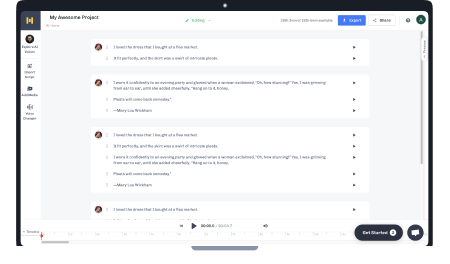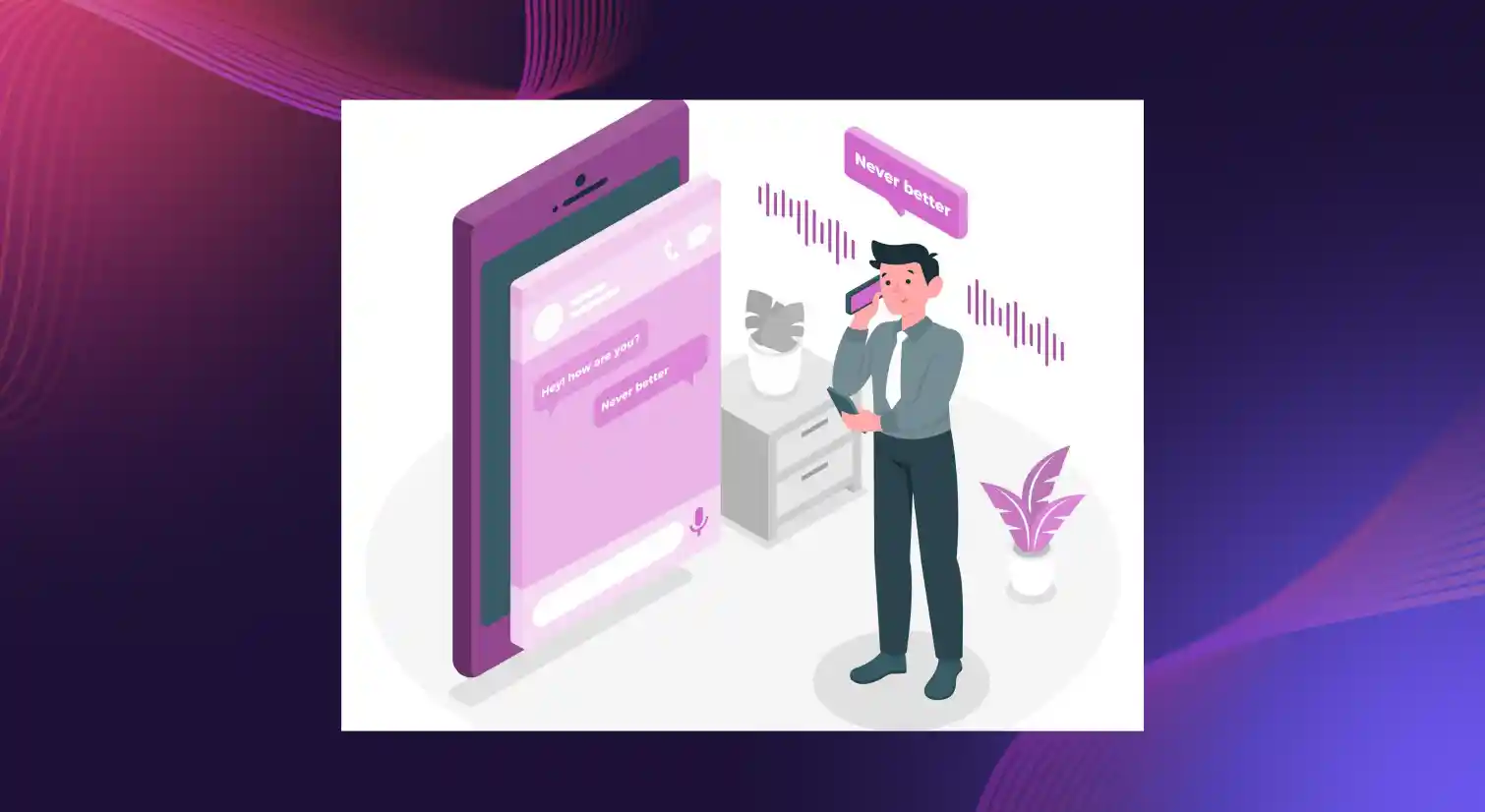The Best Text To Speech For Audiobooks In 2026: A Detailed Comparison

Audiobooks have transformed from a niche market into a booming industry. In fact, according to Statista, it's projected to reach $7.93 billion by the end of this year.
With their growing popularity, Edison Research revealed that more people both adults and children are turning to audiobooks as their preferred method of content consumption.
If you're considering entering the audiobook market, it’s an excellent time to do so. However, traditional audiobook creation, which involves renting studios, hiring voice actors, and undergoing long editing processes, can be costly.
This is where text to speech software revolutionizes the process. It converts written text into spoken word using AI-generated voices. Users can now easily convert a physical book or e-book into an audiobook while customizing key parameters to match the book's tone and style.
For instance, imagine you're creating a suspense audiobook, you can adjust the pitch and tone ensuring the voice sounds tense and engaging. If it's a children's book, you could speed up the reading and lighten the voice to make it more playful and exciting.
Top TTS Tools for Audiobook Creation in 2026
Here are the top text to speech (TTS) tools you should consider for audiobook creation this year, based on our evaluation:
Murf AI
Murf AI checks all of our boxes for audiobook creation. The realistic AI voices it creates can give audiobook narrators a run for their money. Customization options are not just soild but include unique options with respect to speed control, pitch variations, the ability to add emotions, and word-level emphasis, to name a few.
What stands out is its "Say it my way" feature that records your voice and uses it to recreate a spot-on match of your speech. This can be especially helpful if you want to maintain a consistent narration style across a series of audiobooks or to personalize the content without needing to record each sentence manually.
Another feature that caught our eye was the "variability" feature, which can create multiple variations of a single sentence with just a single click. It can help you generate variations of a line to find the one that best captures the intensity you want to convey. All in all, we feel it is the best text to speech tool for audiobooks on this list.
Pros
- Supports 200+ voices in over 20 languages and various accents
- An extensive list of customization options (pitch control, pauses, emphasis, pronunciation adjustments, and more ) that are easy to master
- It comes with proprietary features like "Say It My Way" and "Variability," taking customization to the next level
- API makes it easy to integrate with multiple platforms like Canva, Adobe's Captivate, and audition
Cons
- It imposes a limit on the length of the final audio you can generate
ElevenLabs
ElevenLabs is another competent solution for creating audiobooks. It supports about 30 languages and offers a range of customization options, although not too extensive. It also supports integration with several popular social media platforms. What sets this product apart is that it is specifically designed to handle large-scale audiobook creation.
Pros
- Offers a wide selection of voices to choose from
- It receives frequent updates that ensure that you have access to the latest in TTS technology
- Designed with scalability in mind for large projects
Cons
- The free version does not come with a commercial license
- Limited audio formats to choose from when exporting audio files
Speechify
Speechify is a text to speech audiobook platform specifically designed for people with visual impairments. It uses AI to help read aloud blocks of text or summarize websites. For audiobook creation, it also offers several different voices to choose from in over 60 languages, with customization options to adjust the pitch, tone, and reading speed.
Pros
- Offers a diverse selection of 200 voices across 60+ languages, providing flexibility for various audiobook styles and audiences
- Can import text directly from text sources like PDFs, emails, and articles
Cons
- Access to the premium feature are expensive compared to other tools in the market
- It requires you to be connected to the internet at all times
Lovo
Lovo is a strong candidate as an audiobook converter. It can convert your text files into audiobooks in over 100 languages.
It also allows you to add sound effects and background music to enhance the narration and boost listener engagement. The AI voice customization is extensive, offering features like voice cloning and emotional tone adjustments. Combined with audio effects, this creates a more immersive audiobook experience.
Pros
- Offers a vast selection of over 400 voices in 100+ languages, giving flexibility for different genres and audiences
- Extensive voice customization options, including emotional tone adjustments, pitch control, and pacing, allow for more personalized narration
- Provides royalty-free sound effects and background music that can be added to enhance audiobook production without additional costs
Cons
- The trial is limited to a 15-day trial period
Veed
Veed is a text to speech tool available on the market that allows you to create audiobooks at record speed. Simply upload your script or any text into its audiobook maker, choose an AI voice, and you are done.
It offers about 50 digital voice avatars to choose from, or you can clone your own voice if you wish. Customization options, while not as extensive as some of the other tools on this list, do let you fine-tune the voiceovers to a certain extent.
Pros
- Simple and easy to use
- Voice cloning is a bonus
- High-quality audio output
Cons
- Limited features when compared to the other options on this list
- Users also report performance issues when using the app
Playht
Playht is the final text to speech audiobook maker on our list. It offers over 600 voices, and what sets it apart is the wide variety of niche accents it offers.
For example, it supports about 17 Arabic dialects and about 15 regional accents (each) in English and Spanish. The process is simple: upload your text, choose your voice, preview it, and download it in your preferred formats. It is one of the best choices if you wish to translate your audiobooks to more localized options.
Pros
- Easy-to-use app that allows users to save time
- A vast collection of AI voices to choose from
- A free version to experience the app
Cons
- The paid versions are expensive
- Limited customization options
Key Factors to Consider When Choosing a Text to Speech Tool
Now that we've explored the available tools, let's discuss some key factors to consider when choosing a TTS solution for creating your audiobooks.
Voice Quality
Whether you want to create your own audiobooks or convert ebooks, the audiobook converter you use must be able to create realistic AI voices. So, consider clarity, expressiveness, and accuracy of pronunciation.
Voice Styles
Natural-sounding voices must convey a range of emotions. At the same time, the process of creating them should not be too time-consuming. We should consider these two factors, too, when testing the TTS technologies for creating an expressive audiobook.
Variability
Depending on the type of audiobook you intend to create, it needs to be engaging to keep your readers hooked or encourage user interaction. To do so, it should have robust support for customizing the pitch, speed, and tone of the AI voices.
Support for Voice Cloning
Sometimes, it's easier to clone your voice than create one from scratch. Make sure you analyze each audiobook maker's ability to match your desired pronunciations, word-level emphasis, annotation, and more.
Multilingual Support
The ability to switch languages within a single app will allow you to create multiple audio versions of the same text files. We should also compare and examine the pronunciation accuracy across multiple languages.
Meet Murf Falcon: The Fastest, Most Efficient Text to Speech API
Murf Falcon is engineered to deliver human-like speech at an industry leading model latency of 55 ms across the globe. Use Falcon to deploy AI voice agents that not only talk like regular humans, but also deliver the speech at blazing fast speed with ultra precision.
Falcon is the only TTS API that consistently maintains time-to-first-audio under 130 ms across 10+ global regions, even when processing up to 10,000 calls at the same time. Falcon delivers uninterrupted, natural speech. No lag, no clipped phrases, no robotic tone.
Engineered for Real-Time Performance
Falcon’s architecture is tuned specifically for ultra-low latency and responsiveness:
- Model latency under 55 ms
- Time-to-first-audio under 130 ms
- Edge deployment across 10+ regions for global consistency
Its lightweight, compute-efficient model outperforms larger LLM-based TTS systems on context precision and response timing delivering premium naturalness without inflated infrastructure demands.
Human-Like Speech, in Any Language
Falcon ensures voices sound fluent and expressive:
- 35+ languages, 150+ expressive voices
- Code-mixed multilingual output without accent distortion
- 99.38% pronunciation accuracy
- Conversational prosody for natural tone, rhythm, and pauses
Falcon separates how words are pronounced from the unique qualities of the speaker’s voice, preventing odd tone changes. This also enables the voice to switch languages smoothly in the middle of a sentence. Your AI voice doesn’t just speak multiple languages, it sounds native in each.
Integrates in Minutes
Falcon fits easily into modern development stacks:
- RESTful API
- Python, JavaScript, and cURL SDKs
- Works with Twilio, Anthropic Claude, Discord, and more
Go from API key to live call in minutes, no complex provisioning or specialized infrastructure needed.
Stable and Cost-Efficient at Scale
- Supports 10,000+ concurrent calls with no latency drop
- Predictable performance worldwide via edge routing
- On-prem deployment option for full internal control
- Priced at 1¢ per minute, reducing voice agent costs by up to 50%
Fast everywhere. Accurate always. Affordable at scale. Try Murf Falcon now!
Wrapping It Up
With the growing popularity of audiobooks, TTS technology has been instrumental for streamlining production.
Murf AI stands out with its extensive voice library featuring over 200+ voices across multiple languages making it ideal for various genres. Its voice customization tools, including pitch, speed, and emotional tone adjustments, provide flexibility in shaping narration to suit your story.
With the 'Say It My Way feature,' you can record your rendition of the line to voice-direct the model, capturing the intonation, pace, and pitch of your speech. This feature precisely replicates the length and emphasis of each word and pause, which enables your selected Murf voice to reflect your distinctive style.
For anyone looking to improve or start audiobook production, Murf’s features make it a top choice. Try the free version to see how it can elevate your audiobook creation process now!

Frequently Asked Questions
Can I use free TTS software to create professional audiobooks?
.svg)
Yes, you can use free TTS software to write and play professional audiobook titles, but each tool may come with certain limitations. It's a good idea to try out the free versions to listen and evaluate the features before committing to a paid plan that fits your ebook creation needs.
Can I use TTS software for audiobooks in multiple languages?
.svg)
Most of the TTS software we've recommended here allows you to upload text and create audiobooks in various languages. Some options may offer better customization features than others. Be sure to try their free versions to find the one that suits your reading or listening preferences best.
What file formats can TTS software use for audiobooks?
.svg)
Most of the TTS software on this list supports the most common audio formats used today, .wav and .mp3. Additionally, many tools offer flexibility in exporting files, allowing users to choose between formats like AAC, OGG, and FLAC, depending on the required audio quality and file size.















